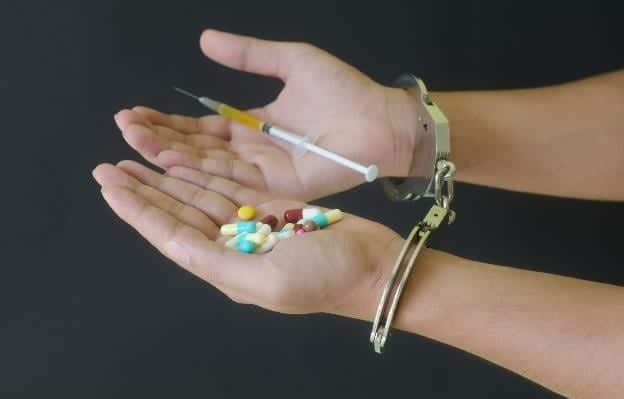
Every year, Minnesota prisons flood with hundreds of people arrested for drug possession. Many of the charges that land them there involve only small amounts of illicit substances found in a car or on a person.
Being caught with a small amount of drugs may seem like a relatively minor crime, but Minnesota law takes all drug offenses very seriously. Our state considers not only common drugs like marijuana and cocaine to be controlled dangerous substances (CDS), but also the compounds found in these substances.
The Penalties for Possessing Different Types of Drugs in Minnesota
Here’s how drug possession breaks down in our state. Minnesota law classifies drugs into five levels called “schedules.”
Schedule I drugs are considered the most dangerous, with the highest probability for abuse and addiction and no recognized medical value. Examples of Schedule I drugs include heroin, LSD, peyote, and marijuana. If you are found in possession of these CDSs, you face the harshest penalties.
Schedules II – V are considered less dangerous, but may still carry tough penalties when involved in possession crimes. Find out which drugs fall under which schedule.
To help you gain a better understanding of the potential punishment for different types of controlled drugs, we’ve outlined the penalties for possessing CDS in Minnesota below:
First degree controlled substance crime: You may be charged with a controlled substance crime in the first degree if you are found in possession of the following drugs:
- 50+ grams of cocaine or methamphetamine
- 25+ grams of heroin
- 50+ kilos of marijuana or 500+ marijuana plants
Potential penalties include 0-30 years in prison and a fine of up to $1,000,000, or both. If you have a prior conviction, you must serve 4-40 years in prison, pay a fine of up to $1,000,000, or both.
Second degree controlled substance crime: You may be charged with a controlled substance crime in the second degree if you are found in possession of the following drugs:
- 25+ grams of cocaine or methamphetamine
- 6+ grams of heroin
- 100+ doses of hallucinogens
- 25+ kilos of marijuana
- 100+ marijuana plants
- 50+ grams of any other narcotic
Potential penalties include 0-25 years in prison and a fine of up to $500,000, or both. If you’ve had a prior conviction, you must serve 3-40 years in prison, pay a fine of up to $1,000,000, or both.
Third degree controlled substance crime: You may be charged with a controlled substance crime in the third degree if you are found in possession of the following drugs:
- 3+ grams of heroin
- 10+ kilos of marijuana
- 10+ grams of any other narcotic
- 5 doses of a Schedule I or II narcotic drug in a school zone, public housing zone, or drug treatment center
Potential penalties include 0-20 years in prison and a fine of up to $250,000, or both. If you’ve had a prior conviction, you must serve 2-30 years in prison, pay a fine of up to $250,000, or both.
Fourth degree controlled substance crime: You may be charged with a controlled substance crime in the fourth degree if you are found in possession of the following drugs:
- 10 doses of hallucinogen
- Any amount of Schedule I, II, or III controlled substance (excluding marijuana) with the intent to sell.
Potential penalties include 0-15 years in prison and a fine of up to $100,000, or both. If you’ve had a prior conviction, you must serve 1-30 years in prison, pay a fine of up to $100,000, or both.
Fifth degree controlled substance crime: You may be charged with a controlled substance crime in the fifth degree if you are found in possession of the following drugs:
- Any amount of Schedule I, II, II, or IV drugs except 42.5 grams or less of marijuana
Potential penalties include 0-5 years in prison and a fine of up to $10,000, or both. If you’ve had a prior conviction, you must serve 6 months-10 years in prison, pay a fine of up to $20,000, or both.
Consequence can become even more severe if prosecutors try to argue that your offense involved selling or trafficking drugs.
Possible Defenses for Drug Possession Charges

Though Minnesota is tough on drug crimes, there are several effective defenses you can use against a controlled substance possession crime.
Unknowing possession. This defense may be used if you were not aware you were in possession of controlled substances.
Officer misuse of power. You can use the police abuse of power defense if your arresting officer used illegal means to find the controlled substances. Examples of illegal means include illegal search and seizure, pressure and threats, or entrapment.
To learn more potential defenses and determine the best strategy for your case, get in touch with an experienced Minnesota criminal lawyer immediately.
About the Author:
Christopher Keyser is a Minneapolis-based criminal and DWI defense attorney known for fighting aggressively for his clients and utilizing innovative tactics to get the most positive results. He has been featured in numerous media outlets due to the breadth and depth of his knowledge, and recognized as a Minnesota Super Lawyers Rising Star (2014–2015), a Top 100 Trial Lawyer (2013–2015), and a Top 40 Under 40 Attorney (2013–2015).





